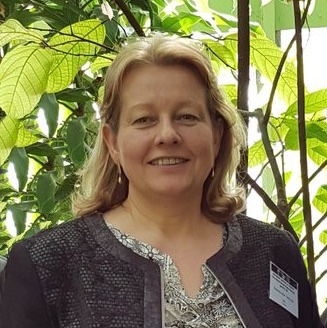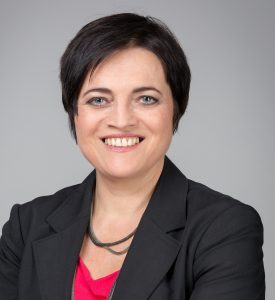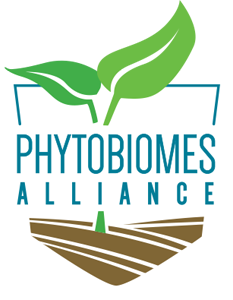
International Phytobiomes Alliance Announces New Appointments to Board of Directors
The International Alliance for Phytobiomes Research is pleased to announce the appointment of Emmanuelle Maguin and Angela Sessitsch as new Board members of the organization.
Emmanuelle Maguin is Research Director at INRA, the French National Institute for Agricultural Research, she is leading a research team working on the humans and animals gut microbiota and is head of the INRA metaprogramme MEM, a transdisciplinary program on microbial ecosystems and metaomics. She is also co-coordinating a Master program at the University Paris-Saclay. Maguin was the director of the Microbiology and the Food Chain (MICA) research division from 2008 to 2016 and has an extensive experience in the field of structural and functional characterization of the microbiota. With her team she contributed to the MetaHIT Project and the first microbiota gene reference. She is co-coordinating the EU-financed Coordination and Support Action “MicrobiomeSupport”, and has previously coordinated or participated in several European Projects.
Maguin has been a member of the Alliance Coordinating Committee since 2017. She was selected for the Board of Directors for her experience in spearheading multidisciplinary activities and her knowledge of microbiota of humans and animals.
“I am extremely pleased to be named member of the Phytobiomes Alliance Board as I think that addressing the challenge of sustainable food and feed production in a context of global changes requires scientific knowledge, innovation and trans-sectorial collaborations,” said Maguin.

Angela Sessitsch, Head of Competence Unit Bioresources at the AIT Austrian Institute of Technology, is an internationally recognized expert on beneficial plant-microbe interactions and established this research area at AIT. Her know-how encompasses the understanding of the ecology and functioning of plant microbiomes, molecular approaches to explore their potential and exploring plant beneficial microorganisms for agricultural applications. Sessitsch has coordinated various national and international projects, such as the recently launched EU-financed Coordination and Support Action “MicrobiomeSupport”, which aims at supporting international microbiome research and innovation in the food system. She also coordinates the EU-financed project MicroMetabolite, which elaborates methods to make use of microbiota to modulate secondary metabolite production in medicinal plants; she also acts as workpackage leader in the EU projects SolACE (Solutions for improving Agroecosystem and Crop Efficiency for water and nutrient use) and MASTER (Microbiome Applications for Sustainable food systems through Technologies and EnteRprise). Angela Sessitsch is the main organizer of the international symposium miCROPe – Microbe-assisted crop production – opportunities, challenges and needs, which took place in 2015 and 2017 in Vienna, Austria. This event will be again held in December 2019, expecting around 350 participants from all over the world.
Sessitsch has been a member of the Alliance Coordinating Committee since 2018. She was selected for the Board of Directors for her leadership in advancing the field of microbiomes and crops and, in particular, for her experience in coordinating multi-national and EU activities in the agricultural microbiome space.
“It is a great honor to join the Board of the Phytobiomes Alliance. The Alliance is an important network for phytobiomes research and innovation, enabling smart agriculture at a global level and connecting major players of academia and industry,” said Sessitsch. “I look forward to supporting the Alliance to achieve its goals and to work towards phytobiomes-supported agricultural systems in the coming years.”
“We are extremely pleased to have Emmanuelle and Angela join the Board as they both bring a wealth of experience in leading multinational and multidisciplinary activities in Europe related to human, animal, and plant microbiomes,” explained Kellye Eversole, the Alliance Executive Director. “As both members are based in Europe, we are excited about continuing to expand our activities significantly in Europe, following the highly successful International Phytobiomes Conference 2018 held in Montpellier, France, in December.”
Launched in 2016, the non-profit International Phytobiomes Alliance facilitates and coordinates international efforts toward expanding phytobiomes research in order to accelerate the sustainable production of food, feed, and fiber for food security. The Board of Directors is in charge of setting the overall vision and mission of the Alliance and provides general oversight for the Alliance operations. Maguin and Sessitsch will join the current Board members, Gwyn Beattie (Iowa State University), Natalie Breakfield (Newleaf Symbiotics), Kellye Eversole, Magalie Guilhabert (Bayer CropScience), Jan Leach (Colorado State University) and Matthew Ryan (CABI) for a three-year term.
About the International Alliance for Phytobiomes Research
The International Alliance for Phytobiomes Research is an international, nonprofit alliance of industry, academic, and governmental partners created in 2016. The goal of the Alliance is to understand, predict and control emergent phenotypes for sustainable production of food, feed and fiber on any given farm.
The Alliance is sponsored by Bayer CropScience, Eversole Associates, The Climate Corporation, the French National Institute for Agricultural Research (INRA), Novozymes, Colorado State University, Evogene, Indigo Ag, the French National Research Institute for Sustainable Development (IRD), the University of Maryland, the University of Nebraska-Lincoln, NewLeaf Symbiotics, the Noble Research Institute, Penn State College of Agricultural Sciences, The Fertilizer Institute, The Waterloo Centre for Microbial Research, the American Phytopathological Society, BioConsortia, Prime Discoveries, AIT Austrian Institute of Technology, and Karyosoft.
www.phytobiomesalliance.org
About INRA, the French National Institute for Agricultural Research
INRA is Europe’s top agricultural research institute and the world’s number two centre for the agricultural sciences. Its scientists are working towards solutions for society’s major challenges. Specializing in food, nutrition, agriculture and the environment, they focus on competitiveness, regional land use, health, sustainable development and bioeconomy.
www.inra.fr/en
About AIT – the Austrian Institute of Technology
The AIT Austrian Institute of Technology is Austria’s largest non-university research institute. With its eight Centers, AIT regards itself as a highly specialised research and development partner for industry. Its researchers focus on the key infrastructure issues of the future: Energy, Health & Bioresources, Digital Safety & Security, Vision, Automation & Control, Mobility Systems, Low-Emission Transport, Technology Experience and Innovation Systems & Policy. Throughout the whole of Austria – in particular at the main locations Wien Giefinggasse, Seibersdorf, Wiener Neustadt, Ranshofen and Leoben – around 1,300 employees carry out research on the development of those tools, technologies and solutions that will keep Austria’s economy fit for the future in line with our motto “Tomorrow Today”.
www.ait.ac.at/en/
###
Contact
Isabelle Caugant
Communications Director
International Alliance for Phytobiomes Research
+1-916-840-8801
caugant@eversoleassociates.com
@phytobiomes
